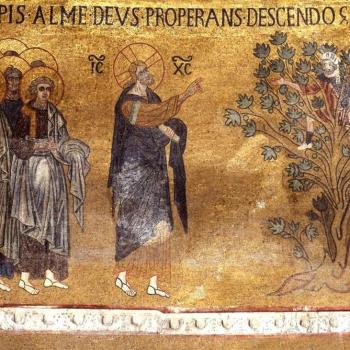On the collective level the same is true. As we awaken to the interconnectedness of all our systems, we see that we cannot change, for example, our energy technologies without changing the economic system that supports them. We learn as well that all of our external institutions reflect our basic perceptions of the world, our invisible ideologies and belief systems. In that sense, we can say that the ecological crisis—like all our crises—is a spiritual crisis. By that I mean it goes all the way to the bottom, encompassing all aspects of our humanity.
And what, exactly, is at the bottom? What do I mean by a "transition between worlds"? At the bottom of our civilization lies a story, a mythology. I call it the Story of the World or the Story of the People—a matrix of narratives, agreements, and symbolic systems that comprises the answers our culture offers to life 's most basic questions:
- Who am I?
- Why do things happen?
- What is the purpose of life?
- What is human nature?
- What is sacred?
- Who are we as a people?
- Where did we come from and where are we going?
Our culture answers them more or less as follows. I will present a pure articulation of these answers, this Story of the World, though in fact it has never dominated completely even as it reached its zenith in the last century. You might recognize some of these answers to be scientifically obsolete, but this obsolete nineteenth and twentieth-century science still generates our view of what is real, possible, and practical. The new physics, the new biology, the new psychology have only barely begun to infiltrate our operating beliefs. So here are the old answers:
Who are you? You are a separate individual among other separate individuals in a universe that is separate from you as well. You are a Cartesian mote of consciousness looking out through the eyes of a flesh robot, programmed by its genes to maximize reproductive self-interest. You are a bubble of psychology, a mind (whether brain-based or not) separate from other minds and separate from matter. Or you are a soul encased in flesh, separate from the world and separate from other souls. Or you are a mass, a conglomeration of particles operating according to the impersonal forces of physics.
Why do things happen? Again, the impersonal forces of physics act upon a generic material substrate of fundamental particles. All phenomena are the result of these mathematically determined interactions. Intelligence, order, purpose, and design are illusions; underneath it all is merely a purposeless jumble of forces and masses. Any phenomenon, all of movement, all of life, is the result of the sum total of forces acting upon objects.
What is the purpose of life? There is no purpose, only cause. The universe is at bottom blind and dead. Thought is but an electrochemical impulse; love but a hormonal cascade that rewires our brains. The only purpose of life (other than what we manufacture ourselves) is simply to live, to survive and reproduce, to maximize rational self-interest. Since we are fundamentally separate from each other, my self-interest is very likely at the expense of your self-interest. Everything that is not-self is at best indifferent to our well-being, at worst hostile.
What is human nature? To protect ourselves against this hostile universe of competing individuals and impersonal forces, we must exercise as much control as possible. We seek out anything that furthers that aim; for example, money, status, security, information, and power—all those things we call "worldly." at the very foundation of our nature, our motivations, and our desires, is what can only be called evil. That is what a ruthless maximizer of self-interest is.
What, therefore, is sacred? Since the blind, ruthless pursuit of self-interest is antisocial, it is important to overcome our biological programming and pursue "higher things." A holy person doesn't succumb to the desires of the flesh. He or she takes the path of self-denial, of discipline, ascending into the realm of spirit or, in the secular version of this quest, into the realm of reason and the mind, principles and ethics. For the religious, to be sacred is to be otherworldly; the soul is separate from the body, and God lives high above the earth. Despite their superficial opposition, science and religion have agreed: the sacred is not of this world.
Who are we as a people? We are a special kind of animal, the apex of evolution, possessing brains that allow the cultural as well as the genetic transfer of information. We are unique in having (in the religious view) a soul or (in the scientific view) a rational mind. In our mechanical universe we alone possess consciousness and the wherewithal to mold the world according to our design. The only limit to our ability to do so is that amount of force we can harness and the precision with which we can apply it. The more we are able to do so, the better off we are in this indifferent or hostile universe, the more comfortable and secure.




